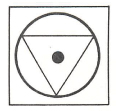Moksha Bookshop
Moksha Bookshop offered a unique selection of literary works from various religious and philosophical traditions including yoga, philosophy East and West, Christianity, Buddhism and more. Moksha also maintained a unique selection of gift items and specialized in hard to find books on: Religion, Healing Arts and Spirituality.
Mosksha Community Education Center
Moksha Community Education Center (MCEC) offered a wide range of activities designed to advance and enhance the depth of human understanding. MCEC also served as a venue for many of the Yoga Anand Ashram Courses in Eastern and Western philosophies as well as a wide variety of life skills.
Christopher Key Chapple, with the support of Yogi Ananda Viraj (Eugene P. Kelly, Jr.), Ashram members and staff, was a driving force in coordinating noteworthy scholars, lecturers and pioneering educators to share extraordinary programs at MCEC.
Free Lectures on Philosophy and Religion:
MCEC provided a forum for the exploration of diverse religious and enlightenment traditions. Past topics have included Zen and Tibetan Buddhism, Shamanism, Jainism, Islam, Platonic Musicology and a wide variety of comparative and mystic religious studies.
Special Events by Donation:
Many special events took place monthly at Moksha, including poetry readings, film showings, and discussions and seminars with front line educators, environmental activists and political leaders.
Alternatives Program by Donation:
Moksha invited representatives of alternative philosophical and spiritual organizations to present lectures and/or videotapes which explained their way of life. While not necessarily endorsing their messages or teachings, Moksha was instrumental in providing a forum for respectful dialogue of differing positions.
Courses and Seminars Sponsored by MCEC
MCEC was an attractive venue for the offering of many courses and seminars which allowed for in-depth investigation into a wide variety of eclectic topics (see list below).
Courses and Seminars Sponsored by Yoga Anand Ashram (see list)
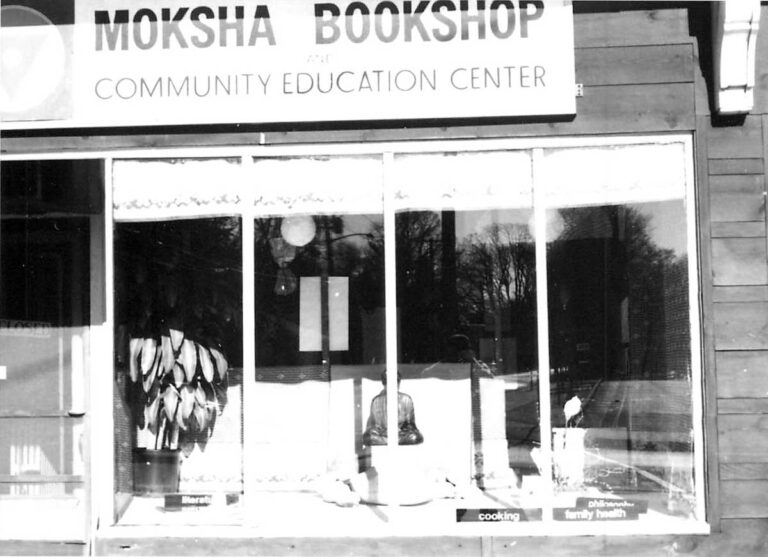
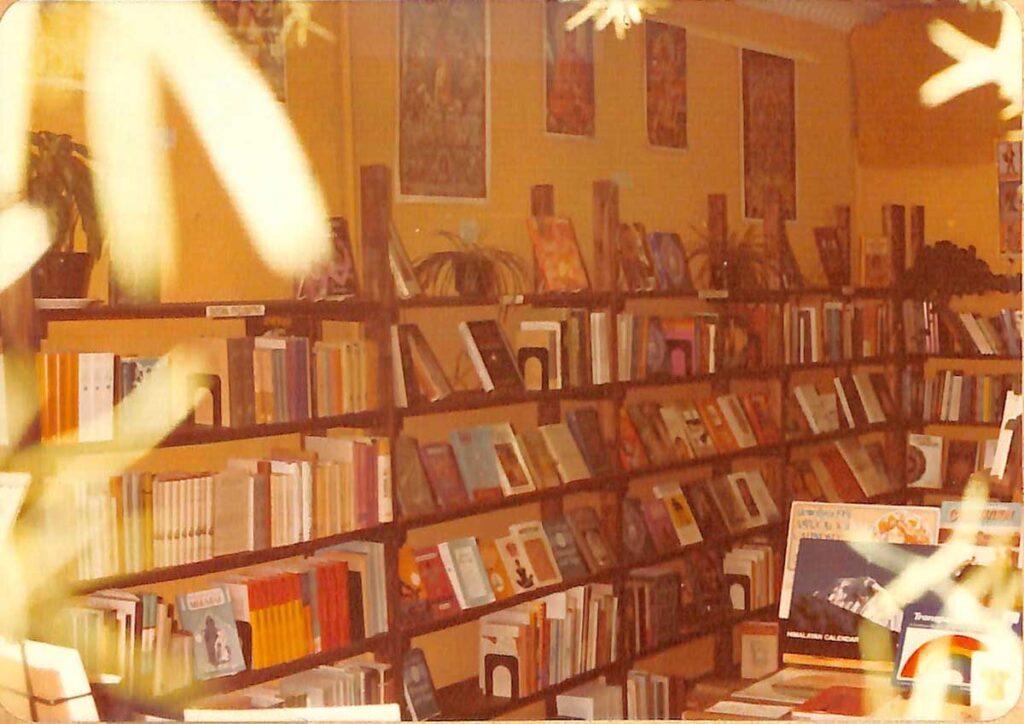
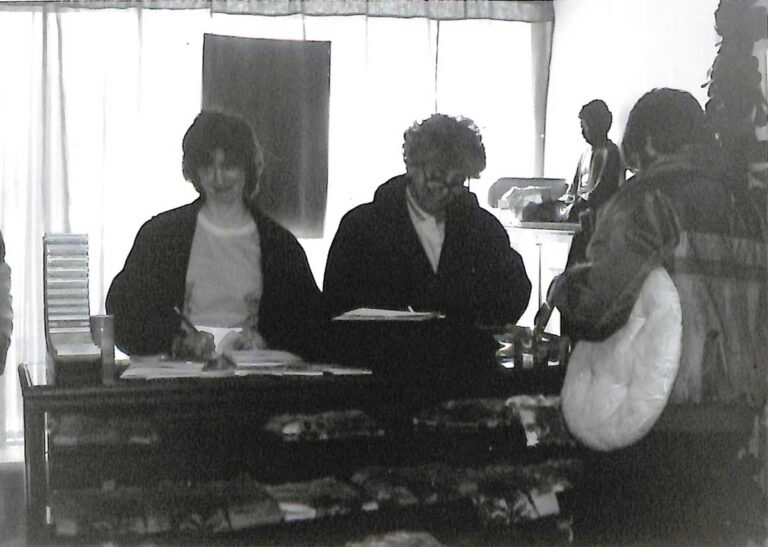
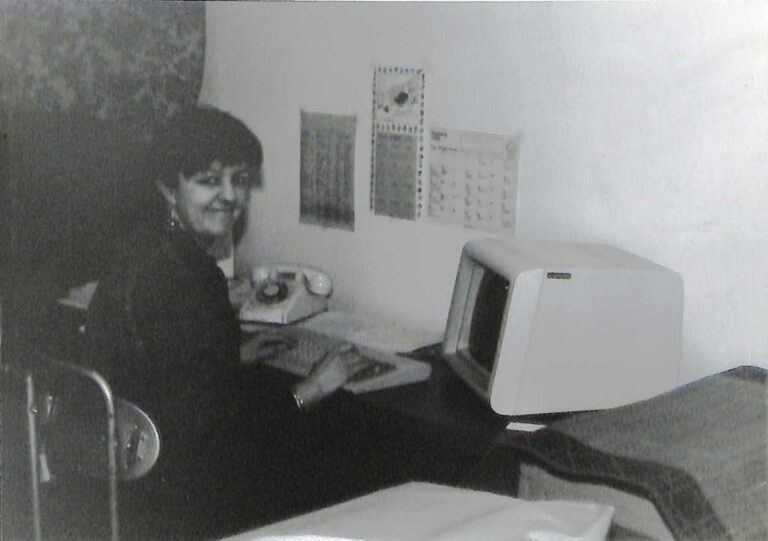
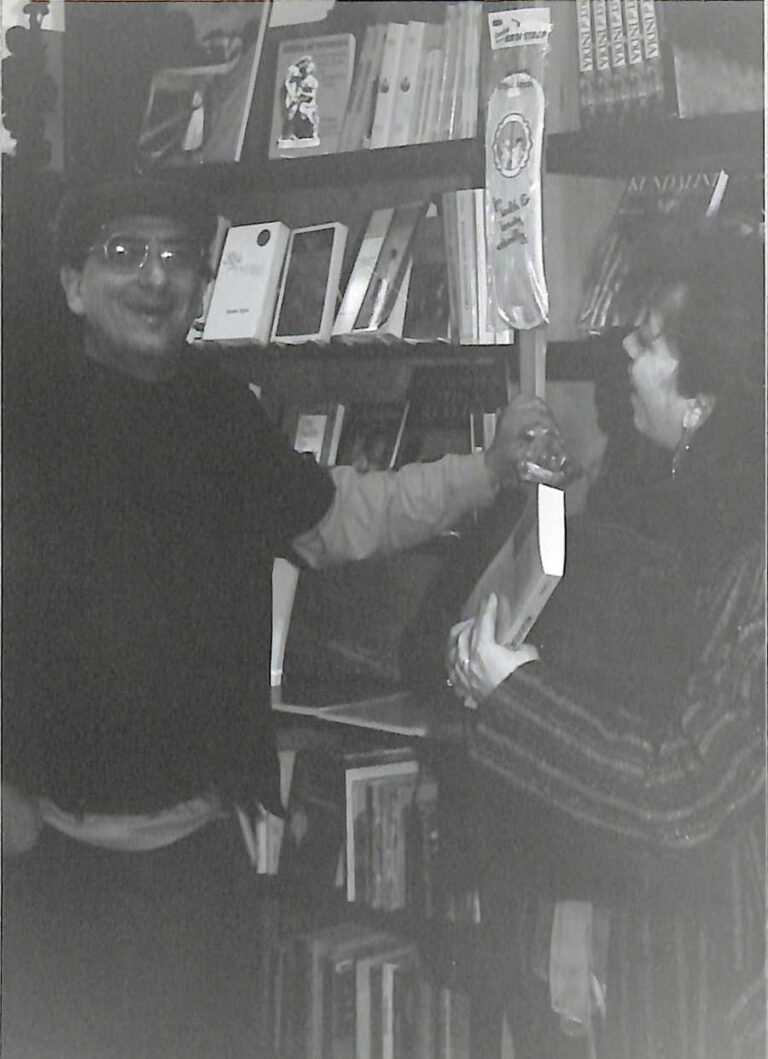
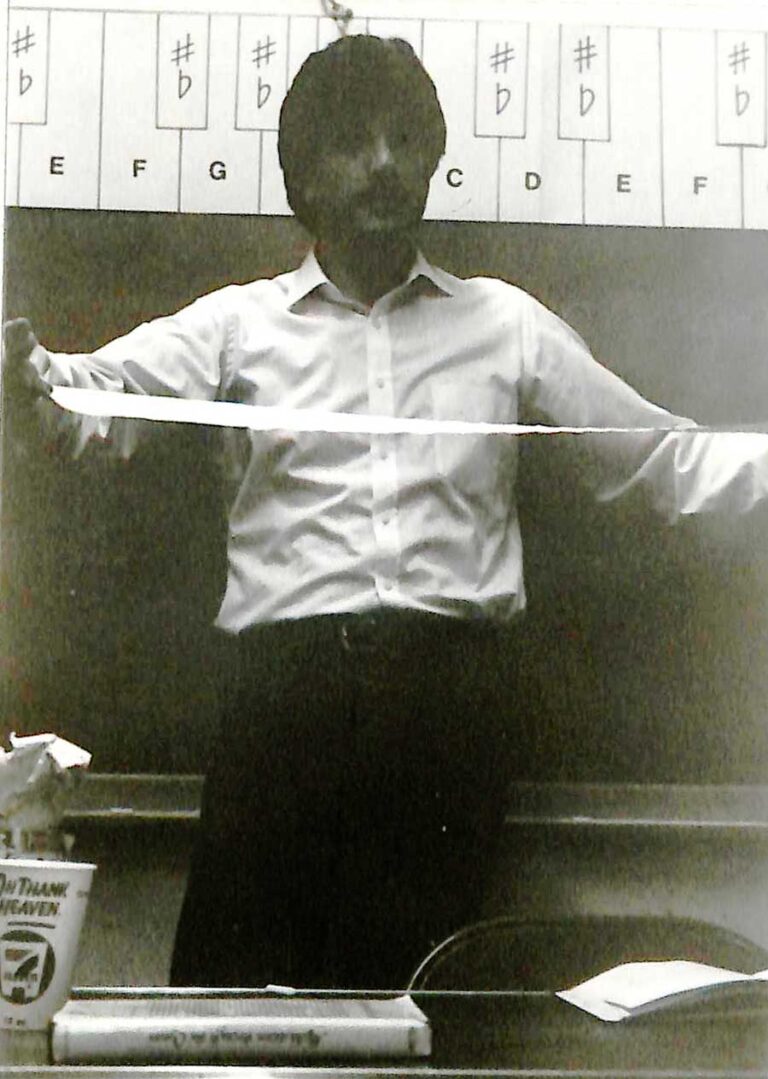
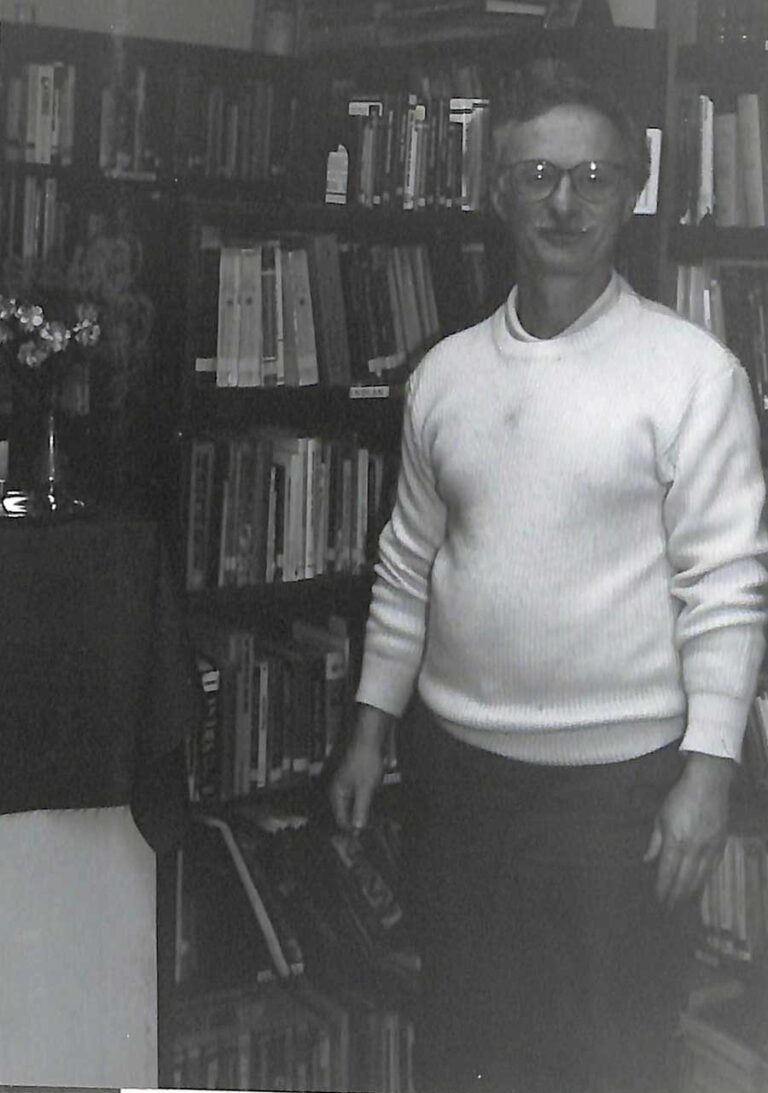
1986 - Lectures, Seminars & Courses Offered at MCEC
Powers of Imaging: Ignatius of Loyola
The “communion of saints” is perhaps the best kept secret of Christianity. Saints are often presented as if their lives had been lived in a vacuum, historical and human. But the saints lived their lives like us, having to make decisions about the circumstances surrounding them. Not only did they have to make decisions , but, as in the case of the sixteenth-century saint, Ignatius Loyola, they devised models to make decisions in a public domain often hostile, sometimes even dangerous to their lives, physically and spiritually. Because they risked so much to be fully human , their humanity is exemplary and it should be studied as such , not however, to imitate the external details of their lives, but in order to uncover our human capabilities for creation. For such is the human condition: once a member of the species performs the extraordinary, the rest of the species, either singly or as a body, becomes capable of performing the same kind of extraordinary deed. Humans are neurophysiologically connected; they form a neural community and each one of us has the power and the inheritance of such a community. Our task, therefore, is not so much to learn new tricks or new theories, but rather to lift the veils that cover human memories so that the original and common mental processes of originality and creation may become visible again. Let us make public the community of saints.
The lecturer, Dr. Antonio T. deNicolas, is Professor of Philosophy at the State University of New York at Stony Brook. He is the author of two major books on Indian philosophy. Meditations Through the Rg Veda and Avatara, as well as several books on the Spanish mystics and translations of the poetry of the Nobel prize winning poet Juan Ramon Jimenez. His most recent work is Powers of Imagining: Ignatius of Loyola.
Tibetan Visualization Meditation
Dr. Janet Gyasto, Director of Institute Services, The Institute for Advanced Studies of World Religions
Liberation Theology: A New Vision of Freedom
Brian Schroeder, Ph.D. Candidate, SUNY Stony Brook
The Feminine in the Religions of the East
Generally speaking, the religions of the East have criticized women for being temptresses and obstacles on the spiritual path. Yet few modern Eastern women have followed the lead of feminists of the West. One reason that there has not been a strong reaction to such traditional teachings may be that the “feminine” has also been understood on a number of other levels. We do not have to look far to find discussions of the positive role played by feminine elements in cosmic, social and psychological realms. In the words of the I Ching, “Yang does not produce by itself, yin does not produce from itself-but when they embrace, they produce the 10,000 things.” When we look at the feminine principle in the context of Eastern cosmology and psychology, we see that the dichotomy between men and women is merely one aspect of a universal phenomenon. Both male and female are essential elements in the make-up of all existent structures, not least the personality of every human individual. This lecture will provide a brief overview of certain ideas on femininity as a positive spiritual principle in two Eastern traditions that seem to diverge the most deeply, i.e., Confucianism and Islam.
The lecturer, Sachiko Murata, is Assistant Professor of Religious Studies at SUNY Stony Brook and author of the book, The Principle of Islamic Law.
Practicing the Primordial Tradition
In the post-modern world religion and .knowledge are fiercely opposed . The exclusive emphasis on rationality that originated during the Renaissance has given way to the externalization and desacralization of knowledge. The privileged position of reason over intuition and intelligence has systematically denied the vital role of Sacred knowledge in all segments of Human existence. Practitioners of the “Primordial” or “Perennial “tradition. however have called for a radical retrieval of that knowledge which is inseparably linked to the Sacred by the overcoming of all forms of forgetfulness that veil the root and essence of human spirituality. This lecture will begin with a brief overview of the major twentieth-century authors who have championed this tradition. Special emphasis will be placed on how they perceived a transcendent unity of religions in the midst of providential multiplicity. Consideration will also be given to the specific forms of practice these authors determined indispensable for a full actualization of human possibilities.
The lecturer, Dr. William Chittick, is Assistant Professor of Religious Studies at SUNY Stony Brook and author of the book, The Sufi Path of Love.
Taoist Acupressure Massage
Acupressure massage uses the same points on the body as acupuncture but uses no needles, relying on the art of massage to stimulate the meridians. Participants in this four week course will learn the principles and techniques of acupressure to dissolve deep seated tension and trauma by reaching the deepest recesses of the nerve and muscle system. These techniques are not painful. In fact, the release of tension is experienced as being very pleasurable. Under the personal guidance of an instructor, participants will learn and experience this ancient form of massage in a relaxed and comfortable atmosphere. Taoist Acupressure Massage brings the body to a high state of health so that it is able to cure itself of disease. The usual comment after a massage is, “My body finally feels really alive.” The book used for this course is Movements of Magic, written by the instructor.
Wear comfortable clothes and bring a blanket or flat cushion. The instructor, Bob Klien has been teaching Tai-Chi Ch’uan for ten years. He holds a degree in Zoology from Cornell University and is currently teaching several forms of meditation, exercise and self-defense.
The Way of Magic
Whether a primitive sorcerer or a contemporary conjuror, the magician is one who works with the deep mysteries of perception. David Abram has been a professional magician for ten years. In 1975 he began as the “house magician “at Alice’s Restaurant (of song and screen renown) in the Berkshires, where he developed his magic into an intimate theater of surprises. Since then he has performed throughout North America, Europe and the Middle East. In London, he worked with Dr. R .D. Laing on the application of sleight-of-hand magic to psychotherapy. In 1980, he wa3 awarded a generous grant from the Watson Foundation to study the links between magic and medicine among traditional shamans in rural Sri Lanka, Indonesia , and Nepal. Abram journeyed into these regions not as an academic researcher but as a wandering magician in his own right, and in this manner was able to meet and become close to native practitioners previously inaccessible to anthropologists.
In this course, using stories, discussion and magic, David will share insights from his journeys. Participants will be introduced to magic will a way of seeing, as a way of remembering and reconnecting with the earth. Appropriate reading materials will be provided in class. It is also recommended that participants obtain The Language of the Birds, ed. by David Guss. The instructor, David Abram, has most recently lived among the Hopi and the Kwakiutl peoples, and has written articles for Parabola, The Ecologist, Orion and other journals.
Creation and the Sacred: An Interpretive Journey Through the Book of Genesis
This course is a four week exploration through the Hebrew account of the creation of the earth. We will begin the translating anew from the Hebrew text and working through the historically accumulated interpretations of the text including those of Rashi (a second century Kabbalistic teacher) , Rambam (also known as Moses Maimonides), and Ramban (a thirteenth century Hebrew mystic/scholar). Participants will be familiarized with the Kabbalistic technique of “gematriya “and encouraged to further their own renderings of the text in accordance with their visions of Genesis. Comparisons of Genesis myths from different religions will also be explored using the backgrounds of the students as a starting point and working backwards from the Occidental account of creation to the Indian (Vedic) and Babylonian accounts. Participants will receive copies of the instructor’s original translation of Genesis as well as selections from Kabbalistic texts.
The instructor, Yifat Hachomovitch, was born in Jerusalem and has traveled throughout India , Europe and the Middle East. She is a student of history, philosophy and religion, and is currently working on her Ph.D. dissertation, The Philosophy of the Market place. Among her published works are translations of Genesis, the Talmud and the Kabbala.
T’ai Chi Ch’uan: Wu Style
T’ai Chi is an ancient Chinese exercise for health developed by Taoist monks out of a form of kung-fu at the Shao-Lin Temple during the Sung Dynasty. Based upon the principles of the I Ching and philosophical Taoism, T’ai Chi is a slow moving, meditative form that cultivates calmness, tranquility, balance, centeredness and harmony. Participants in this four week course will learn the first third of the Wu style forms. The book to be followed in this course is T’ai Chi Ch’uan: Body and Mind in Harmony by Sophia Delza, the West’s foremost master of the Wu style.
Wear comfortable clothes. The instructor , Niall Caldwell , studied Wu style Tai Chi with Robert Neville and is currently teaching Tai Chi Ch’uan at SUNY Stony Brook .
Macrobiotic Living
Macrobiotics is a holistic system of health and nutrition that integrates all aspects of living. This dietary system is the embodiment of a philosophical tradition that protected our ancestors from many of the degenerative diseases that we suffer from today. Based on several common-sense practices, macrobiotics employs the use of whole grains, local vegetables, seafood and sea vegetables rather than highly processed, artificial foods. This four week course will begin with a discussion of the theory and practice of macrobiotics with special emphasis on making the transition from our conventional dietary practices to the philosophical approach to macrobiotic living. The second class will be devoted to an introduction to Do-In, a form of massage that compliments the macrobiotic lifestyle. This will be followed by instruction in the medicinal approach to natural healing. The final class will be a sampling of the various foods used in a macrobiotic diet.
The instructor, Susan Cohen-Skally, received her training in macrobiotics from Michie Kushi and learned Shiatsu from Shizuko Yamamoto. She has been practicing macrobiotics for ten years and has used her skills as a macrobiotic cook to help people who have cancer, heart disease, arthritis, emphysema and leukemia.
The Wonder of Halleys Comet
In ancient times, comets were greatly feared and regarded as evil omens. This fearful reaction is understandable given that ancient humanity employed the order and regularity of the heavens to structure and organize their everyday life. The rhythms of the sun, moon and stars provided a paradigm for the organization of calendars, time-keeping and astrological predictions. The seemingly random appearance of comets often represented chaos and disorder. This lecture explores the ancient symbolism of comets and also how these symbols were usurped at the dawn of the Renaissance. The over two thousand year old history of Halley’s comet will be discussed along with a slide presentation of the pictorial drawings and photographs that have been recorded.
Halley’s comet, which appears every 76 years, made its most recent appearance in August of ’85. It’s most spectacular manifestation will be in March and April of ’86. Expert advice and instruction on where and when to view Halley’s comet will also be provided. The lecturer, Tom Affatigato, is the astronomy instructor at the Vanderbilt Planetarium in Centerport, Long Island.
Sex and Spirituality (seminar)
Nothing has been as problematic for religion as sexuality. For the most part it has been regarded negatively as an obstacle to spiritual development. On the other hand some spiritual teachings seem to endorse sexuality as a vehicle towards liberation. In this two week seminar we will examine these different attitudes from a psycho-historical perspective (the evolution of consciousness). On the basis of this groundwork we hope to articulate a theory or theology of sexuality that is integral (incorporating all levels of consciousness), global (drawing from the Tantric and Taoist wisdom of the East as well as Western liberation philosophies) and contemporary (taking into account the cosmological theories of the new sciences). The recommended text for this seminar is The Passionate Life by Sam Keen and is available from Moksha Bookshop.
The instructor, Daniel Kealey, has done graduate work in psychology, religion and philosophy, and has been practicing Tantra yoga for 15 years, including 3 years in India. He holds an M.A. in Philosophy from Osmonia University, India, an M.A. in Integral Psychology from the California Institute of Asian Studies and is currently a Ph.D. candidate in philosophy at SUNY Stony Brook.
Foot Reflexology
Reflexology is a science of healing based upon the principle that the feet are “microcosmic” representatives of the entire body where every organ, gland and part of the body has a corresponding “reflex point'” on the foot. By properly stimulating these reflex points you can relax the body, stimulate circulation and revitalize the nervous system. The idea behind reflexology is not new; research has shown that it had been practiced in ancient Egypt. Con temporary reflexology was first researched and developed by Eunice Ingham in the 1930’s and has gained in creasing popularity ever since. This four week course is designed to be an introduction to the theory and practice of foot reflexology. Participants will learn the specific techniques needed to work on themselves and others. These techniques are simple (only the hands are used) and effective for relieving tension and improving health and well-being.
The instructor, Diane Alther, is a registered nurse, holds a degree in psychology, has studied nutrition and Shiatsu, and was trained in foot reflexology at the International Institute of Reflexology.
Inner Poetry
Rocco Lo Bosco
The Way of Radical Understanding or Divine Ignorance (Alternative Program)
The Laughing Man Institute
1985 - Lectures, Seminars & Courses Offered at MCEC
Ikkyu: The Zen Poet of Madness and Eroticism
Dr. David Dilworth
Does the Enlightened Buddhist Think?
Ursula Bernis
Ecstasy and Sobriety: the Ways of the Sufi
Dr. William Chittick
American Indian Spirituality
Dr. John Grim
St. Teresa, The Women
Dr. Antonio deNicolas
An Evening of Poetry
Dr. Lou Nordstrom
The Way of Vedanta (Alternatives Program)
Swami Tathagatananda
Jungian Dream Workshop (Special Event)
Lee Robins
The Emerging Holistic Paradigm
Dr. Michael von Bruck
The Healing Tao: Awakening Healing Energy (Alternative Program)
Master Mantak Chia
Poetry Reading with Phillip Mahony (Special Event)
Phillip Mahony
Religion and War
Dr. Peter Manchester
Understanding Between Religions
Dr. Kusumita Priscilla
The Integral Yoga and Philosophy of Sri Aurobindo
Daniel Kealey
1984 - Lectures, Seminars & Courses Offered at MCEC
T’ai-Chi Ch’uan: Stillness in Motion
Alan Low (Teacher), C.W. Post Adelphi University
Godhead and the Downward Way: The Life and Work of Meister Eckhart
Dr. Peter Manchester
Benares: Sacred City of the Hindus
Dr. James D. McMichael
Detachment, A Healthy Way Through Stress (Special Event)
Dr. Paula Manchester
Operation Salt March
Yoesh K. Gandhu
Tribal Vision and the Emerging Informal Economy
Dr. Thomas Berry
Poetry and Spiritual Enlightenment
Dr. Christopher Chapple
The Shiatsu Way of Life (seminar)
Allan Low, Administrator, Institute for Advanced Research in Asian Science and Medicine
Native American Myth and Image (seminar)
Ralph Esposito
The Joining of Heaven and Earth: The Neo-Confusion Way
Dr. MaryEvelyn Tucjer Grim
Animals, Religion and Scientific Laboratories (seminar)
Dr. Christopher Chapple
Philosophy and the Public World
Dr. Gerald M. Turchetto
1983 - Lectures, Seminars & Courses Offered at MCEC
William Black and the Promise of Universal Mystical Vision
Dr. Thomas J.J. Altizer, Prof. of Religious Studies and English, SUNY Stony Brook
Swami Vivekananda: His Message for the West
Swami Tathagatananda, monk of Ramakrishna order, Vedanta Society, NY, NY
World Health Alternatives
Tam Stevenson, Medical Anthropologist, SUNY Stony Brook
Introduction to Zen Practice
Lou Mitsunen Nordstrom, Director of Training, Zen Community of New York, NY, NY
Kabbalistic Geometry: An Introduction
Dr. Leonora Leet Brodwin, Prof. of English, St. John’s University
Faith and Enlightenment in Buddhism
Dr. Sug-bae Park (Ass’t. Prof. of Religious Studies, SUNY Stony Brook
Reincarnation
Dr. Christopher Chapple, Ass’t. Director, Institute for Advanced Studies of World Religions
Vegetarianism and Detoxification
Dr. William Rice, Staff Nutritionist of Wholistic Health Center,, Institute for Self Development, Manhasset, NY
Buddhism and the Environment
Dr. Richard A. Gard, Ass’t. Prof. of Judaic Studies & Director of Religious Studies,, SUNY Stony Brook
The Sufi Understanding of Death
Dr. William Chittick, SUNY Stony Brook
Limitation of God and the Life of the Mind: The Religion of the Talmud
Dr. Robert Goldberg, Ass’t. Prof. of Judaic Studies & Director of Religious Studies, SUNY Stony Brook
Shiatsu
Dyana Yee
Mystical Experiences and Technologies of Transformation
Dr. Antonio T. deNicolas, Prof. of Philosophy, SUNY Stony Brook
1982 - Lectures, Seminars & Courses Offered at MCEC
Ground Water Pollutants
Dr. Henry J Matthies
Zen Meditation and Enlightenment
Dr. Sung-bae Park
Natural Childbirth and Chiropractic
Dr. Bernard Furshpan
Nuclear Cove Up
Karl Grossman
Powers of Imagining: The Secret Text of the Bhagavad Gita
Dr. Antonio T. deNicolas
Nutrition and Health
Dr. William R. Holub
Right/Left Brain: Educational Implications
Dr. Roy Smith
Native American Religions: Model for an Ecological Spirituality
Dr. Don St. John
The Six Perfections in Tibetan Buddhism
Tibetan monk Khenpo Tsewang and Dr. Janet Gyatso, Yeshe Nyingpo Meditation Center, NY, NY and The Institute for Advanced Studies of World Religions
Shiatu
Dyanna Ye
Facts and Fallacies of Vegetarian Nutrition
Dr. Monroe E. Burton, Chiropractor, Member of International Assoc. of Prof. Natural Hygienists
Nuclear Witnesses: Accounts from Inside the Industry
Prof. Leslie Freeman, English Teacher, New York Institute of Technology
Vedantic Experience of Reality
Prof. John B. Chethimattam Prof. of Philosophy, Fordham University
Midwifery and Homebirth
Barbara McDonnaugh, Midwife, New York University Hospital
Energy Economics
Prof. Martin Melkonian, Assoc. Prof. of Economics, Hofstra University
Christian Mystics
Prof. Peter Manchester, Assoc Prof., Center for Religious Studies, SUNY Stony Brook
Alexander Technique: Holistic Massage
Kadambari, M.D. and Ramananda, Psychotherapist, Rajneesh Body Therapy Center
Awakening Intelligence: The Waldorf School
Prof. Sheldon P. Stoff, Chairman of the Dept. of Education, SUNY Stony Brook
1981 - Lectures, Seminars & Courses Offered at MCEC
Practice in Tibetan Buddhism
Lecturer: Geshe Losang Jamspal
Tibetan Buddhism, though only available to Westerners for little more than a decade, has rapidly become one of the most popular forms of meditative practice in the U .S. The lecturer studied Tibetan language, philosophy, and literature for 14 years at the major monasteries of Ladakh and Tibet. He continued for 14 more years at Benares Sanskrit University in India, where he earned the Shastri Degree in Sanskrit and Pali literature (1964) and the Acharya Degree in Buddhist and Indian philosophy in Sanskrit (1968). Geshe Jamspal has taught at Benares Sanskrit University, the University of Delhi, the Lamaist Buddhist Monastery of America, and the American Institute of Buddhist Studies.
The Gospel of John
Lecturer: Professor Peter Manchester
The most problematic of the four gospels, the book of John offers great insight into the development and early days of the Christian community. Professor Manchester, a Christian theologian, studied at Harvard Divinity School for two years and received his Ph.D. from Graduate Theological Union, Berkeley, California. Currently Assistant Professor at the Center for Religious Studies, State University of New York at Stony Brook, he has also taught at the University of California, Davis.
Religious Experience is in the Brain
Lecturer: John Stamm
Research into the workings of the brain in relation to religious or mystical experience has brought a new vitality to study of both psychology and meditation.
Jon Stamm, a neuropsychologist, has conducted brain research for the past 30 years, and has been actively involved with meditative practices for 40 years. He received his doctorate from the University of Southern California and has taught at the State University of New York at Stony Brook since 1967, where he is a Professor in the Psychology Department.
Human Future and the Land
Dr. Thomas Berry, Founder of History of Religions Program, Fordham University
Hua-Yen Buddhism
Dr. Steve Odin, Center for Religious Studies, SUNY Stony Brook
The Poetry of Bhakti
Dr. Narayan Hegde, Ass’t. Prof., Dept. of Comparative History, Ideas and Cultures, SUNY Old Westbury
Vedanta and Modern Physics
Vinod K. Misra, SUNY Stony Brook
Practice in Tibetan Buddhism
Geshe Losang Jamspal, American Institute of Buddhist Studies
BODY ENERGY: CULITVATION AND HEALING SERIES:
Music Therapy and Guided Imagery and Music
Madeline E. Ventre, Music Therapist, Massapequa, NY
BODY ENERGY: CULITVATION AND HEALING SERIES:
Shiatsu
Shiatsu, also called Acupressure, is an Oriental healing method in which specific points on the body are pressed with the fingers. An outgrowth of the ancient common medicine practiced in China, Shiatsu was brought to Japan with the spread of Buddhism in the sixth century. In continues to be a major therapy in that country.
The lecturer, Professor Allan Low, teaches Asian Studies at C.W. Post and T’ai Chi at Adelphi University. He studied Shiatsu under Master Wataru Ohashi and serves on the Board of Directors of the Shiatsu Education Center of America in New York. Professor Low has given Shiatsu workshops in Canada at the Sivananda Yoga Center in Montral and at the Yoga Retreat on Paradise Island, Bahamas. He has been teaching Shiatsu for five years.
Aikido
Aikido is a non-violent form of self-defense where one learns to come into harmony with one’s attacker. It is also considered a form of meditation in motion. Aikido was started by Muyeshiba i c.Tapan during the 1930s and is based on three older arts: jujitsu, spear fighting, and swordfighting.
The lecturer, Dr.Howard Pashenz, has been practicing Aikido for 18 years. A psychologist and psychoanalyst, Dr. Pashenz holds the rank of sandan, black belt 3rd degree. He is also an Adjunct Professor of Religion at Adelphi University.
T’ai Chi Ch’uan
T’ai Chi Ch’uan is a meditative system of exercise which has as its focal point total and complete relaxation, promoting in the practitioner a deep and systemic calm–mind and body in harmony. T’ai chi ch’uan developed out of a style of kung-fu practiced by Taoist monks at the Shao-lin Temple about a thousand years ago. Today, T’ai Chi Ch’uan is one of the most widespread systems of exercise in China.
The lecturer, Herb Ray, studied with Master William C.C. Chen in New York and currently conducts classes in West Hempstead, NY.
Chiropractic
Chiropratic is a form of healing through which the body is brought into balance. It is found effective in dealing with physical, chemical, and mental stress, especially when applied with improved exercise and nutrition.
The lecturer, Dr. Janette Corlito, conducts a private holistic chiropractic practice in Farmingdale and is on the staff at Integral Health Services in Manhattan, an affiliate of the Integral Yoga Institute. Dr. Corlito is a graduate of the New York Chiropractic College.
Applied Kinesiology
Dr. Martin L. Lesin
Naturophathic Healing
Dr. S.W. Jungreis, Blue Point, NY
1979-1980 - Lectures, Seminars & Courses Offered at MCEC
The Lapis Lazuli Radiance Buddha:
The Buddha of Healing
Lecturer: Professor Raoul Birnbaum
Received his PhD. from Columbia University in Buddhist Studies, is a research associate of the Metropolitan Museum of Art. He is the author of a recently published work: The Healing Buddha.
Shaman, Sufis & Sages
A Six Week Investigation into the Nature of Religious Experience. Three great expressions of religious experience will be explored in this six week course: The shamanic vision as explained by Mircea Eliade and made explicit in the writings of Carlos Castaneda; the Sufi ecstasies of the Islamic poet Rumi; The way of the sage as found in the Chinese classics of Lao Tsu and confucius. The instructor, Dr. Christopher Chapple, teaches at the State University of New York at Stony Brook and is Assistant Director of the Institute for Advanced Studies of world religions) as well as Co-manager of Moksha Bookshop.
The Earth Community
Lecturer: Thomas Berry, Associate Professor of the History of Religions at Fordham University, has made extensive studies of the religious foundations of the Eurasian world, of the tribal cultures of the North American continent, and the transformations in the human mode of Being brought about by modern science and technology. His books include Buddhism and Religions of India.
Rediscovering Our Roots in the Western Mystical Tradition
Lecturer: Richard Payne is Editor-in-Chief of The Classics of Western Spirituality , a series which includes the original writings of 60 universally recognized teachers within the Catholic, Protestant, Eastern Orthodox, Jewish, Islamic, and Native American Indian traditions.
Theory of Enlightenment in Zen Buddhism
Sung-bae Park, Assistant Professor of Religious Studies at SUNY Stony Brook, received his Ph.D. in Buddhist Studies from the University of California at Berkeley. Dr. Park has studied and taught Buddhism for a number of years, both in Korea and the United States.
Dream Yoga in Hindu and Buddhist Tantra
Steve Dennison is completing his doctoral dissertation on Western process philosophy and Hua Yen Buddhism.
Zen Meditation
Zen Meditation has been described by Eido Roshi, the Abbot of the New York Zendo,as “•••a practice of mindfulness that saves one from alienation; a practice of purification that frees one from anxiety.” Lorca Morello is a practicing Zen Buddhist, and a resident of the Zen Studies Society, Inc. of N.Y. City. The society was founded in 1956 to support the research and writings of the great Zen scholar, Dr. D. T. Suzuki.
In the Footsteps of the Saints: Pilgrimage Places in Western India
Professor Feldhaus has travelled and studied extensively in India and is a specialist in the religious life of Maharashtra, a state in western India. She currently is an Assistant Professor of the History of Religions at Fordham University, where she teaches courses in Sanskrit and Hinduism.
The Yoga of the Yogavasistha
Mr. Chapple, Co-manager of Moksha Bookshop and Research Assistant at the Institute for Advanced Studies of World Religions at SUNY Stony Brook, is currently completing his doctoral dissertation on the Yogavasistha, an extensive Sanskrit philosophical treatise
The Myth of Invariance: The Origin of the Gods, Mathematics and Music from the Rg Veda to Plato
Ernest G. McClain, Professor of Music at Brooklyn College and author of The Myth of Invariance and The Pythagorean Plato, specializes in the interrelationship among music, mathematics, and religious experience.
Moksha: Evolution and the Liberation of Consciousness (1979)
The lecturer, Rakesh (Richard Kleifgen), is a teacher of meditation and philosophy and Executive Director at the Jain Meditation International Center in Manhattan. He has studied with Gurudev Shree Chitrabhanu for eight years and has travelled and studied in India on three occasions.
WHOLISTIC HEALTH LECTURE SERIES:
Acupuncture and Acupressure
This session will be conducted by Dr. Jong H. Ree. Dr. Ree studied acupuncture and acupressure at Kyoug University, Seoul, Korea, where he received his O.M.D. (Oriental Medical Doctor) degree. He is a New York State licensed acupuncturist, currently conducting private practice in Queens and Jericho. Dr. Ree, who has been practicing acupuncture for over 20 years, formerly ran the acupuncture clinic at Brunswick Hospital in Amityville, NY.
Homeopathy
This session will be conducted by Donna Wilk. Ms. Wilke is a lay homeopath was has conducted first aid courses in homeopathy throughout New York State. A member of the Homeopathic Study Group of Long Island and she studied homeopathy at Millersville State College in Pennsylvania, one of the few academic centers which offers courses in homeopathy in the United States.
Amma Therapy
This session will be conducted by Steven Schenkman. Amma is an Oriental form of therapy utilizing massage and hand pressure, based on the fundamental principles of acupuncture. It was introduced in the West by Mrs. R.C. Sohn, Co-Director of the Wholistic Health Center, Manhasset, New York . The lecturer, Steven Schenkman, studied with Mrs. Sohn and teaches Oriental Therapeutic Massage at the Center, which is an affiliate of The Institute for Self Development, a non-profit, educational foundation.
Nutrition and Health
This session will be conducted by Anne Bressler. Anne Bressler, President of the Long Island Chapter of the National Health Federation, is an active nutrition consultant, lecturer, instructor, and columnist, having been involved with natural nutrition for over 25 years. Ms. Bressler is a founding member of the Hypoglycemic Foundation, and currently serves on its board of directors. She is also a past president of the East Coast Healthfood Organization.

